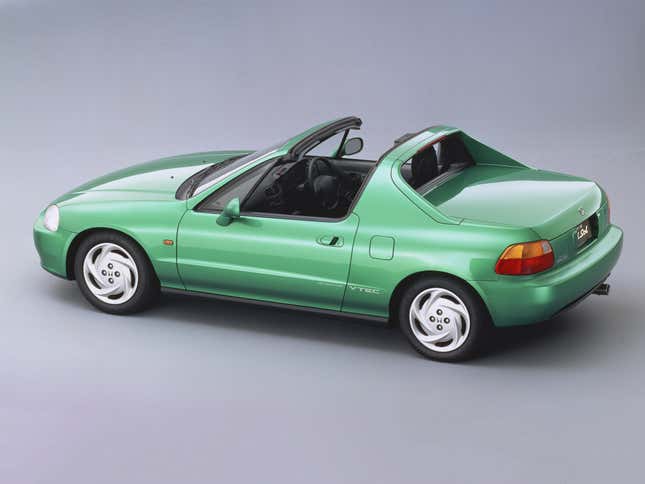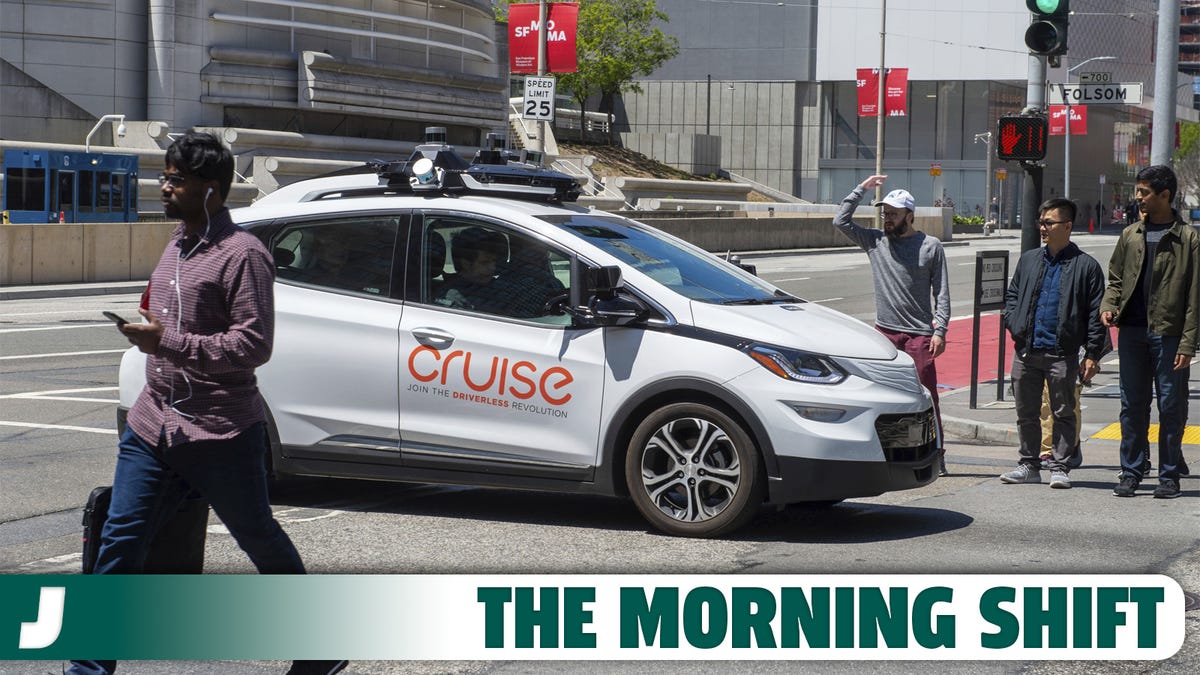Good morning! It’s Thursday, July 27, 2023 and this is The Morning Shift, your daily roundup of the top automotive headlines from around the world, in one place. Here are the important stories you need to know.
1st Gear: It’s All About China, Always
Regulators from the National Highway Traffic Safety Administration have still yet to issue a verdict whether General Motors can deploy 2,500 of its driverless, human controls-free Origin vehicles around the country. But lobbyists from the Alliance of Automotive Innovation (AAI) — a consortium of automakers and suppliers — as well as some members of Congress on both sides of the aisle are pressuring their fellow lawmakers to remove regulatory barriers that have stifled widespread deployment of autonomous vehicles on U.S. roads. This sort of legislation has run out of gas in Congress before, so interested parties appear to be taking a new tack, and it involves China. From Automotive News:
John Bozzella, CEO of the Alliance for Automotive Innovation, likened the situation to the transition to electric vehicles, citing China’s early strategic investments in EV technologies and its control of battery supply chains.
“Do we want this safety technology to exist and the vehicles to be built and to operate here in the U.S. instead of China? This is a question that can only be answered by federal policymakers,” Bozzella told lawmakers at a hearing convened by a House Energy and Commerce subcommittee.
In written testimony, Bozzella further elaborated on this issue, explaining that federal legislation that addresses regulatory barriers is “essential” to the development of AV technology and U.S. leadership, citing the demise of Ford- and Volkswagen-backed Argo AI as a possible harbinger of the industry’s direction without it.
Of course it’s not just the AAI responsible for the fearmongering. When China’s involved, our elected representatives are plenty good at that on their own. From Reuters:
“China is currently moving ahead with ambitious plans to lead the development and deployment of this technology,” said House Energy and Commerce Committee chair Cathy McMorris Rodgers at a hearing Wednesday.
“We cannot trust the Chinese Communist Party to set the standards for this industry and we certainly cannot trust them to protect our data and individual rights.”
Comparing the global “race” to self driving to the “race” to EVs is a little disingenuous; they’re two completely unique challenges in so many ways that, frankly, we don’t have the time to get into here. It stands to reason why lawmakers would want to cultivate a domestic battery supply chain rather than leaving that to the rest of the world including, yes, China. But when it comes to autonomy, the priority should probably be less on moving fast to win a totally self-imposed competition with an enemy and more on ensuring the cars GM and Google are developing don’t get in the way or hurt people.
[Carnegie Mellon University professor Philip] Koopman — who has been working in the AV safety field for more than two decades — urged caution, asking Congress to consider a federal framework that prioritizes safety, transparency and accountability.
“The mobility, economic and safety benefits promised by manufacturers will only materialize if self-driving vehicles can be made safe and reliable at scale,” Koopman told lawmakers. “The industry is not there yet.”
On China, he said the race is not to put robotaxis on roads but to ensure they’re safe and reliable.
“Exempting our own companies from safety standards might provide the illusion of progress for their technology. However, foreign competitors are taking safety much more seriously than many of the U.S. companies due to stronger regulatory regimes at home,” according to his written testimony.
Whatever advantage China has in this arena, it achieved it through government intervention, not by allowing companies to run roughshod on public roads with unproven tech. Unfortunately, that’s never really been Silicon Valley’s mantra.
2nd Gear: The UAW Isn’t Tavares’ Problem
Stellantis CEO Carlos Tavares has kept himself out of contract talks with the United Auto Workers thus far, which UAW President Shawn Fain has called him out on. The chief executive defended that decision on Wednesday, citing the company’s “very powerful leadership team in North America,” via Automotive News:
He said he understands the union’s “posturing” but believes it doesn’t add “any value to what we need to do and what we must do for our employees.”
UAW negotiations kicked off this month, with Fain visiting Detroit 3 plants on the first day instead of doing the ceremonial handshakes of years past with automakers.
“I will be where I think will be the most useful to the organization, to our employees,” Tavares said during a media roundtable Wednesday. “With our local management, we have everything we need to have constructive, open-minded and collaborative discussions with our union partners, and we are looking forward to having those discussions very soon.
Also, Tavares said he’s not planning for a strike, even though one is very much on the table:
Strikes are “destructive for everybody, so it’s not a value-creation process,” Tavares said. “It’s just a way to put more muscle in a negotiation.
“What we would go for is constructive dialogue, open-minded dialogue, recognition that the world is changing, recognition that we need to fix short and midterm issues and from there, I think there is enough imagination around the table to find solutions, and certainly destroying value is not going to make the life of our people better, and we want to protect the life of our employees. That’s our mindset.”
That all sounds very nice, and I’m sure the UAW would love to get there and “find” those “solutions” with the Big Three while continuing to get paid. Sometimes, though, that’s just not possible. That’s why strikes happen.
3rd Gear: China Is Taking Its Toll On VW
Volkswagen has cut its annual sales target, per Reuters, due to ongoing sales headwinds in China:
The reduced sales target of 9-9.5 million vehicles, from 9.5 million previously, was down to a dip in first-half sales in China, Chief Financial Officer Arno Antlitz said.
Antlitz said the so-called “performance programmes” in the works to make the group’s brands more efficient would have to begin yielding results this year, adding it had no time to lose in the face of rising competition.
Its next Capital Markets Day in April 2024 will focus on its strategy in China, where Volkswagen still hopes to be the number one international carmaker, though its electric vehicle (EV) sales for now lag local EV makers and U.S. rival Tesla.
“Competition is intensifying and customers are cautious,” Antlitz said on a press call following half-year results, referring to the global autos market. “We need to achieve the first results of these programmes in the second half of 2023 to make us more resilient.”
Shares of the automaker were down 3.3 percent in Berlin on Thursday.
4th Gear: China Is Also Helping VW
Volkswagen has made its $700-million, five-percent investment in Xpeng official, much to the joy of the Chinese startup’s investors. From Bloomberg:
The deal gives VW a 4.99% stake in Xpeng and an observer board seat. The pair plan at least two new VW-badged battery-powered models for the Chinese market, with the first due to arrive in 2026. VW is fighting to halt a slide in sales in its most important market, where Tesla Inc. and local champion BYD Co. have raced ahead.
For nine-year-old Xpeng, the tie-up gives it prestige backing from one of the world’s biggest automakers, and may soothe investor concerns after a run of disappointing earnings and sales results. It will also gain a “significant” source of recurring revenue that could help it reach profitability sooner than expected, Co-President Brian Gu told Bloomberg Television.
Xpeng shares surged as much as 33% in Hong Kong trading early Wednesday, mirroring a 27% jump in the New York-traded stock.
This deal mirrors another recently reported, that Audi will partner with SAIC to improve its EV offerings for the Chinese market as well. Xpeng’s fortunes haven’t been swell as of late, as the company has reported 10 consecutive months of poorer sales relative to last year, per data from InsideEVs.
Reverse: We Need More Planes With Names Like ‘De Havilland Comet’
On this day in 1949, 74 years ago…
Neutral: Here, Have a del Sol

The official vehicle of summer, forever.

